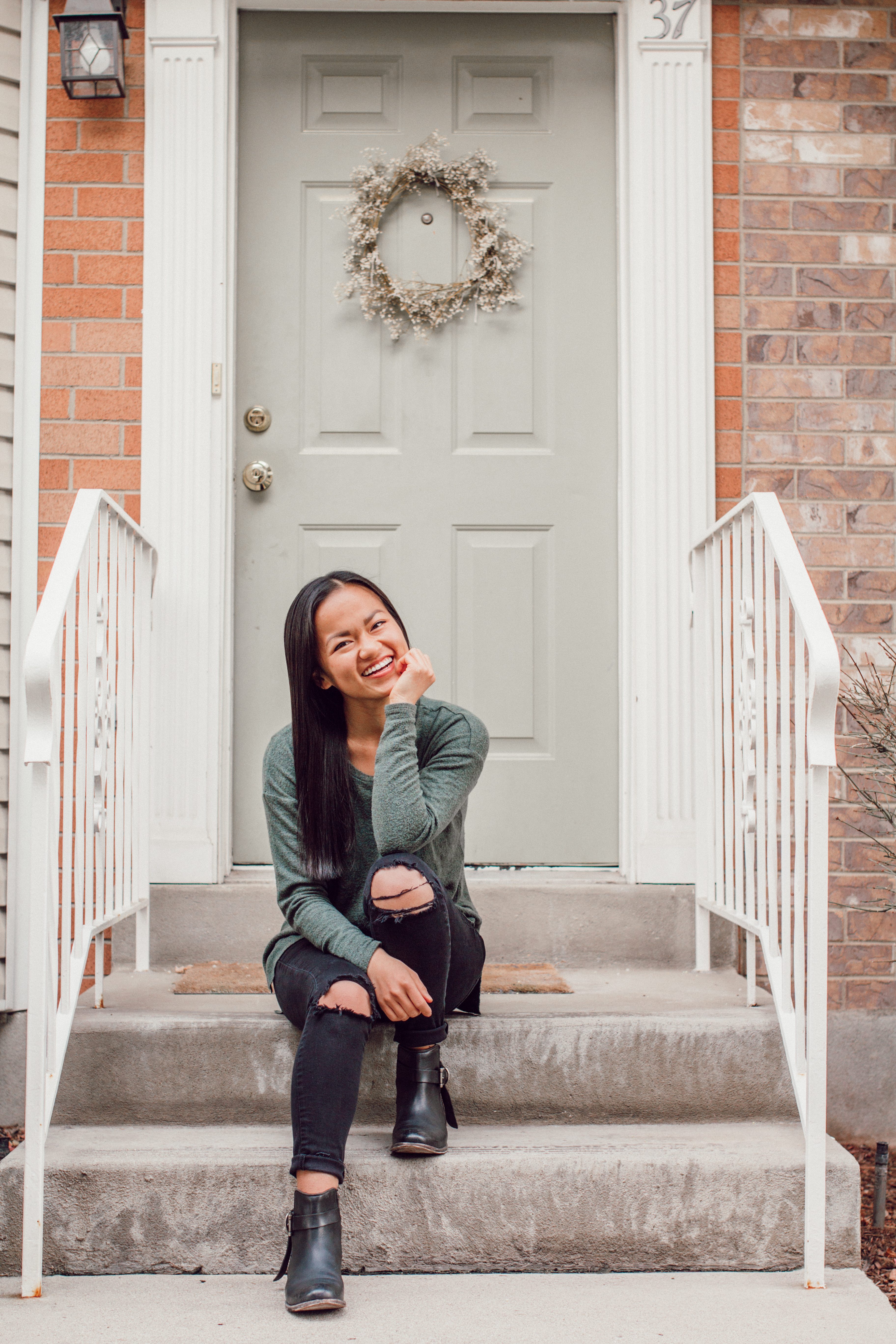
Ashley Howe was just a few days old when she was left on the doorstep of an orphanage in Nan Jing, China. After she was adopted by an American family living in Portland, Howe said her entire life has been proving to herself, her parents and her peers that she will never stop fighting for success.
“I think I’ll never be the smartest person in the room, but I will always work the hardest,” Howe said.
Howe narrowed the sum of her life into three words: resentment, resilience and rejoicing. For as often as she felt she didn’t measure up or have the resources she saw others had, Howe said the experiences of her childhood motivated her to work twice as hard for her goals.
Howe said it was likely the one-child policy in China that led her birth parents to abandon her in 1995.
China scholar Kay Ann Johnson wrote in her 2016 book “China’s Hidden Children” that the policy was most strictly enforced in the 1990s and early 2000s. The majority of babies given up for adoption were girls, Johnson wrote, because of traditional preference for a son. Most Chinese parents Johnson interviewed said it was usually with great grief that parents abandoned or arranged adoptions for their children.
Howe said based off what her parents told her, conditions at the orphanage were challenging. At 12 months old — the typical age in which most babies walk — Howe said she hadn’t even learned how to sit up. The majority of her day, she said, was spent lying in her bed. Her face was covered with sores and blackheads from resting on her face, and she said she was given sugar water because the orphanage didn’t have enough money for milk.
Howe said she doesn’t blame her birth parents for the decisions they were forced to make, nor does she consider herself to be an adopted child. She feels so much gratitude for the love and preparation her parents put into obtaining and raising her. That love, Howe said, helped her grow up with a solid sense of self.
Howe’s parents spent a strenuous year of social work visits filling out paperwork; sending money, gifts and clothing to the orphanage; and then embarking on the trip to China to pick her up. It was a lot of work, she said, which always made her feel privileged and loved.
“I’ve really just been so lucky to have the future that I’ve had,” Howe said. “My dad always says, ‘We’re doing the best we can, Ashley,’ so I’ve never felt like I can be angry or frustrated at my situation because it could always be worse.”
Howe said she learned the value of hard work while growing up. Her dad worked three to four jobs at once, she said, so she never experienced much leisure time. In sixth grade, she said she would help her dad put newspapers in mailboxes after school, sometimes going from 5-10 p.m. Each member of her family has always worked, which she said has taught her diligence.
“There’s so much to my childhood that I don’t know how to piece it, and I didn’t realize how hard it was until somebody told me,” Howe said.
Every one of her siblings suffered from addictions or were victims of abusive relationships, she said. Their struggles included gambling, teen pregnancies, drug addictions, pornography, alcoholism and even homelessness.
“Their addictions made me so much stronger as a person, and I am grateful it was so up close and personal that it showed me what I didn’t want,” Howe said. “It’s opened up my perspective on life, on honest struggles and insecurities — how raw life can be.”
Howe said her parents were both alcoholics. This year marks 10 years since her dad quit drinking. Her mom hits two years this year.
“For my dad to be an addict, to stop and then to support his wife as she’s an addict for the next 10 years says a lot about the resilience he has as a person,” she said.
Confronting the myriad of addictions in her home is what built her resilience, Howe said.
When Howe was 6 years old, her grandmother moved into their house. Howe credits her grandma’s moral integrity and “spunk” as a major source of light for her as she grew up. Her grandma taught her to clean and do the dishes by hand because the dishwasher never worked. She taught her Spanish and about the gospel and how to be a good person.
Howe said her grandmother’s praise kept her personal expectations high, and her grandma’s activity in the Church kept her faith going too.
In addition to her grandmother, Howe had a strong support system in the Young Women’s group in her area. The other moms were good parental roles in her life, she said.
Howe said she sometimes felt there were things she couldn’t talk about at home, so she talked to her friends instead.
“It was really in Young Women that I learned what was expected of you as a daughter of God, even as a mother someday,” she said. “It taught me basic principles of Christ and of happiness.”
However, finding another person in the Church among her peers who could fully empathize with her life situation isn’t something she said she’s ever been able to do.
It wasn’t until she served as a missionary for the Church in the Buenos Aires West Mission from 2015 to 2016 that Howe said she found people she could relate to more than anyone else in her life.
“They were just good people in crappy situations,” Howe said. “Often times they were converts that were a very small light in a big community. I was like, ‘Oh, I get it,’ because of where I grew up. Being in a very nice suburb in Portland though, I didn’t talk to people about the problems I was going through.”
Howe became the first member of her family to attend college when she was accepted into BYU. She said this accomplishment marks a milestone not just for her, but for her family as a whole.
But coming to BYU was not without its hiccups.
“I really hated BYU when I first came here. I hated everything because it was a daily reminder of everything that I didn’t have,” Howe said. “Instagram made it feel like everyone’s life was just this montage of great moments and every time I called home, I got crappy news. And everyone has their issues, but everyone was superficially happy.”

Howe said many people she met on campus and saw in blog posts had been sheltered and didn’t have any idea what a life like hers is like.
Some of the comments directed at her, Howe said, have been ignorant at best. Once when she told a coworker that her dad was a mailman and her mother a custodian, he questioned why she bothered to come to college at all, she recounted.
Howe said it was in the global supply chain program that she finally found her place at BYU.
“These professors have been like my parents and mentors, and my friends have been like my siblings,” Howe said. “We really pride ourselves on being a family — and that’s what changed my perspective on BYU.”
Professor Simon Greathead said he has known Howe for two years. She was one of his students in global negotiations and has served as an executive vice president in the Global Supply Chain Club, of which he is the head.
“Ashley is so very kind and considerate of others. She uses her intuition. I would also note that Ashley is mentally strong, extremely intelligent and wise beyond her years,” Greathead said. “Her leadership in the Global Supply Chain Association has led me to believe Ashley is one of the finest young women you will ever find.”
Howe said one of the biggest goals in her life has been to earn a college degree, but what she really wants is an MBA. She said her dream following school is to work at a Fortune 500 company. Beyond that, Howe said she wants to get married in the temple and have a family and show people that working moms can do it all.
Howe was recently offered a full-time job at Adobe in San Francisco where she’ll begin as a strategy and business operations analyst in July.
She called this one of her life’s greatest achievements and credits it to the friends and professors who spent hours every week aiding her in the final presentation she made for the company during the application process.
“If I could offer any advice, I would say not to be afraid to ask for help because people really do care about you and want to be a part of your journey,” Howe said.
Looking back on her life, Howe said she is grateful for her family and who they’ve helped her to become.
“I’m grateful that I got here, that I overcame the roadblocks, that I didn’t just become another leaf in the cycle. I’m grateful for the gospel for that,” Howe said. “I’m just grateful for my story. I didn’t let my circumstances be my excuse.”




